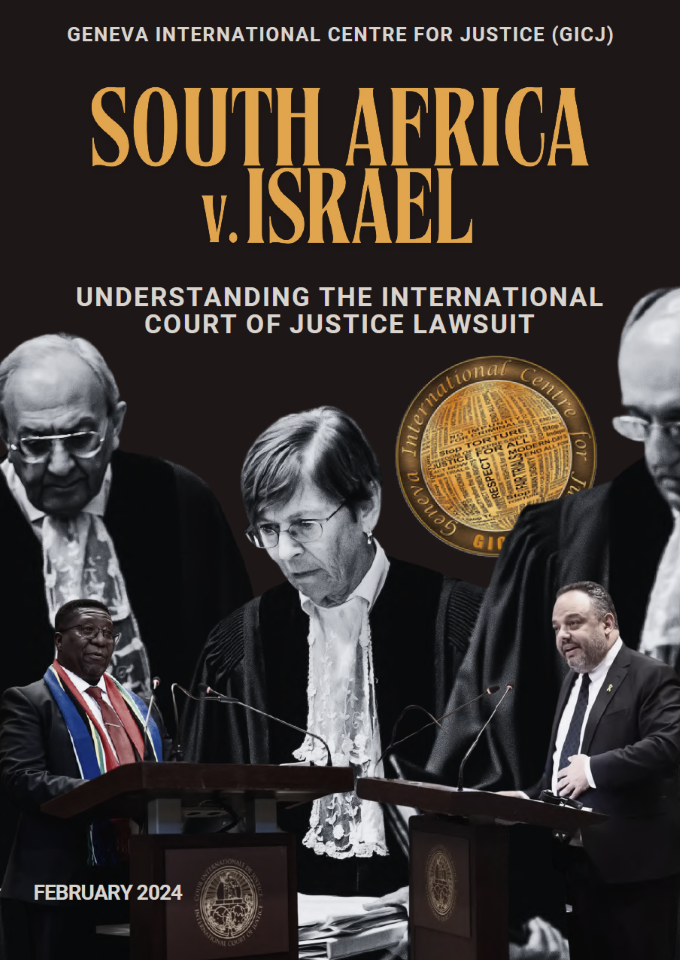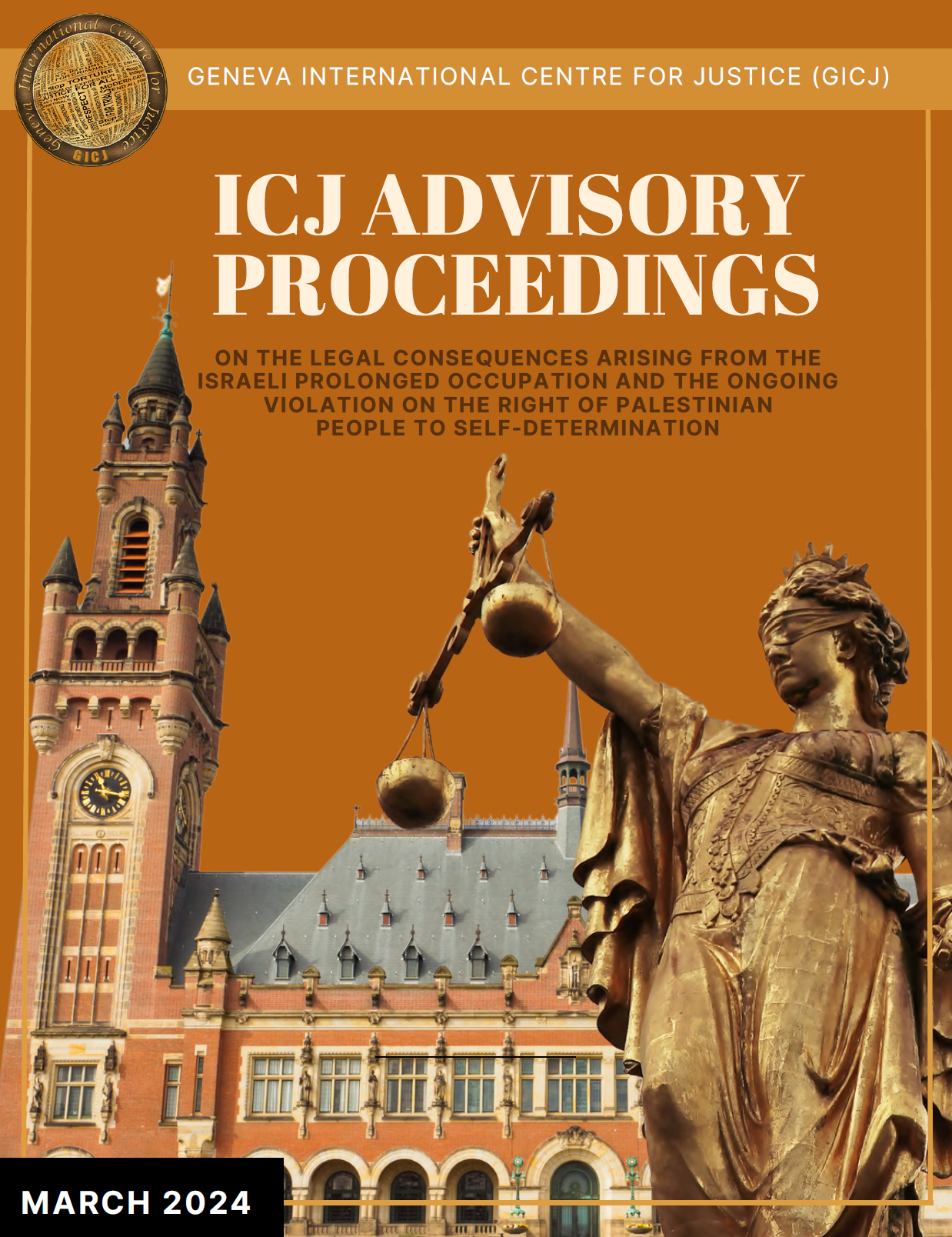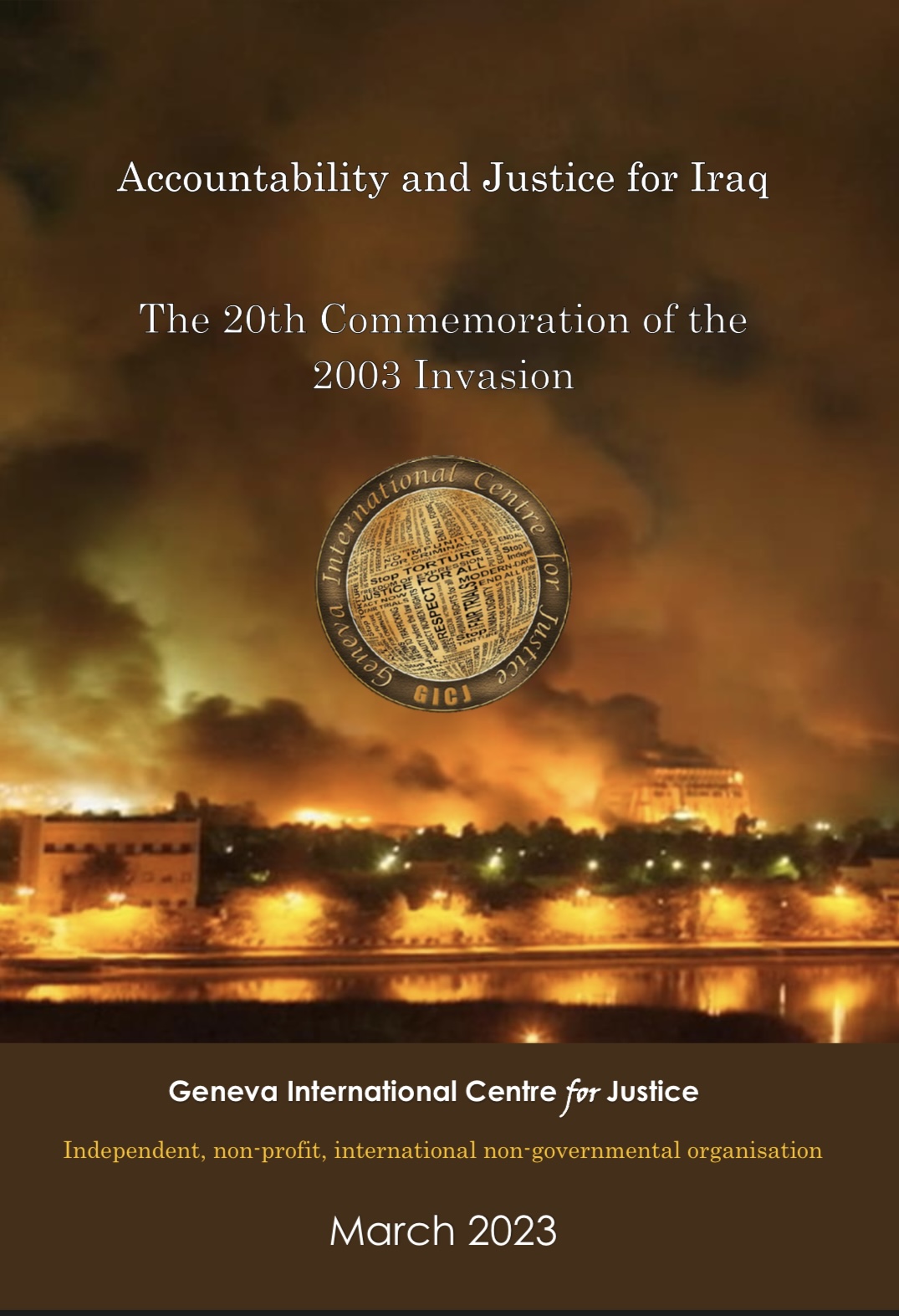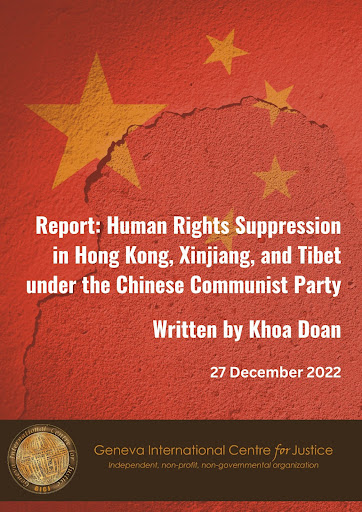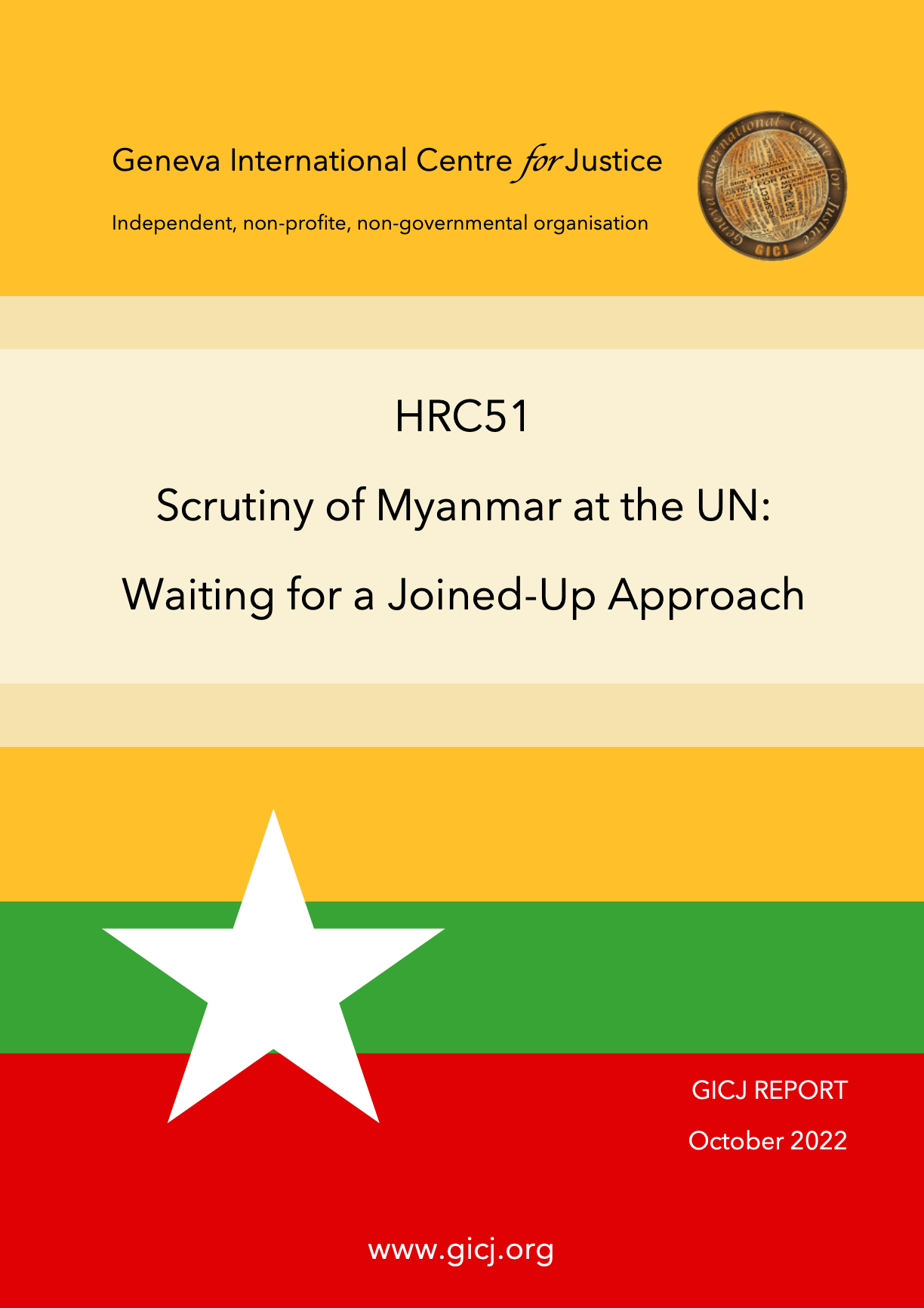Introduction:
The year of 2017 has seen significant challenges regarding various human rights abuses across the many regions of globe. Geneva International Centre for Justice (GICJ) has made tremendous efforts to bring these issues to light for the international community, civil society, and the United Nations. Below is a summary of the activities GICJ has taken to address these numerous issues in order to bring awareness to the global community and justice to the victims.
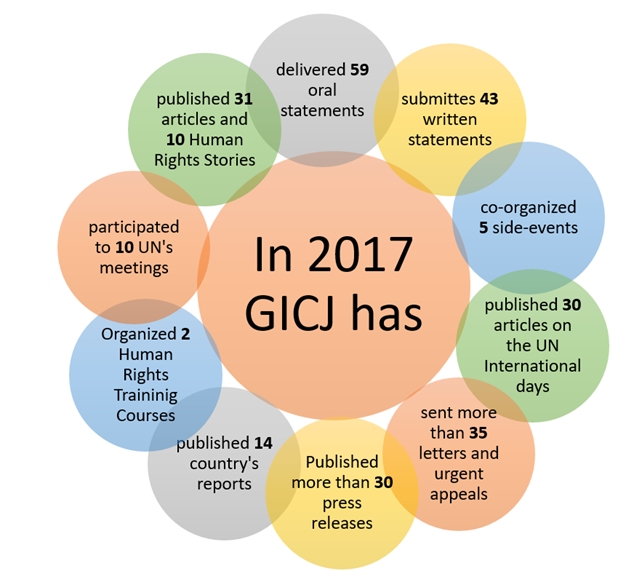
|
In 2017, during the UN Human Rights Council Sessions (HRC), Geneva International Centre for Justice (GICJ) delivered 10 oral statements and submitted 6 written statements on the human rights situation in Iraq. In these, GICJ highlighted the fact that in 2017, 14 years since the illegal invasion of the country by the US and its allied, the Iraqi’s are still deprived of their most basic needs. It was also underlined how the invasion has created a power vacuum that has fuelled and spread terrorism across the region. The Iraqi citizens are not just the victims of ISIS but also of the frequent airstrikes and the violent crimes of government forces and pro-government militias. In these statements, GICJ has equally called attention on the dramatic conditions of the city of Mosul in Iraq, in which, since the beginning of the battle for the liberation of the city from the ISIS, civilians have experienced grave violations their human rights and the city was totally destroyed.
GICJ called on the international community to ensure accountability for the committed atrocities and that the Iraqi victims must receive compensation and reparation for the crimes and violations endured. Furthermore, for the protection and safety of the Iraqi people, GICJ recommended to the UN the establishment and exercise of a monitoring mechanism to investigate human rights violations and identify all perpetrator to be held in account. During the 36th session of the HRC, GICJ co-organized a side-event entitled "Destruction of Mosul" that shed the light on the dramatic impact of the so-called “liberation campaign“ on Mosul’s civilians, infrastructures and historical sites.
In 2017, GICJ also sent 6 urgent appeals and addressed 4 letters to the United Nations High Commissioner for Human rights, one letter to the Special Representative of the Secretary-General for Children in Armed Conflict, one report to the Special Rapporteur on the promotion and protection of human rights and fundamental freedoms and one letter to the UN Special Rapporteur on extrajudicial, summary or arbitrary executions concerning her mission to Iraq. During this year, GICJ equally published 9 articles and 2 press releases on different themes related with the human rights situation in Iraq. |
|
During the 2017 HRC Sessions, GICJ has delivered and submitted several statements on the issue of the Occupied Palestine. More precisely, GICJ has delivered 8 oral statements and 15 written statements concerning different issues related with this subject. In these statements, GICJ expressed serious concern about the human rights violations that daily occur against the Palestinian people. Over the past seven decades, Israel has continued its illegal occupation, settlement activities as well as its discriminatory laws, racial oppression and segregation of the Palestinian population living under the constant threat of evictions, confiscation of their lands, restrictions on their freedom of movement, and deprivation of access to basic resources. GICJ equally urged the Council to take effective and urgent steps and called on the international community to support the appraisal to stop the Israel illegal settlements and ensure the safety and security of Palestinians. GICJ has also recommended the HRC and other competent UN bodies to take all necessary measures to make Israel abide by its international obligations and cease its prolonged occupations as well as all other violations of Palestinians’ inalienable rights. In 2017, during the 34th Session of the HRC, GICJ has equally co-organized a side-event entitled “Israeli Settlement and Violence in the Occupied Palestinian Territories and Israel“.
During this year, GICJ has also sent 3 urgent appeals to the UN High Commissioner for Human Rights, 4 urgent appeals to the Special Rapporteur on the situation of human rights defenders, one urgent appeal with other organizations to the UN Secretary General and one urgent appeal to the Special Rapporteur on Torture and Other Cruel and Inhuman or Degrading Treatment or Punishment. GICJ has equally published 12 articles and one press release on different themes related with the issue of the Occupied Palestine. |
|
Syria is another country on which GICJ has been focusing in 2017. During the HRC Sessions that have taken place during this year, GICJ delivered one oral statement and submitted 3 written statements. In these, GICJ condemned all parties, which have breached international humanitarian law, international human rights law and provoked unthinkable suffering to the civilian population. GICJ also called upon the UN to take immediate measures to prevent security and opposition forces as well as militias from breaching IL and IHRL. It was equally urged the Syrian government to comply with human rights and humanitarian law standards; in particular to put an end to illicit trials, torture and summary executions of persons deprived of their liberty. The statements also stressed the deliberate denial of humanitarian aid to millions of people. In 2017, GICJ has equally published a report on which it is provided a general overview of the Syrian civil war and its repercussions on the civilian population. Furthermore, GICJ wanted also to highlight the urgent need for concerted actions to speed up the peace process and achieving lasting peace. During this year, GICJ has also published an article on which it expressed its dismay concerning the level of brutality reached by the Syrian war and strongly condemns the use of all typed of chemical weapons. Furthermore, in this article, GICJ equally urged the UN to immediately dispatch an independent committee to investigate the situation on the ground. |
|
In 2017, during the HRC Sessions, GICJ delivered 4 oral statements and submitted 3 written statements on the human rights situation in Yemen. In these statements, GICJ highlighted the grave humanitarian crisis of the country that have been worsening by cholera, famine, and by the lack of access to healthcare and water. Furthermore, it called on the members of the council to increase their pressure on all parties to end its blockade on Yemen. In a written statement, GICJ emphasised that the right to education of Yemeni’s children is denied and called on all parties to the conflict to comply with international humanitarian law and to ensure the protection of children. GICJ equally called on the international community to take all necessary measures to halt the Iran and Houthi militia illegal interference in the conflict, whose actions are hindering the achievement of peaceful settlements. Furthermore, GICJ also recommended to immediately endorse an international independent investigation into alleged war crimes and crimes against humanity and to refer to the situation in Yemen to the international Criminal Court. During this year, GICJ also published a report on the country’s situation and two articles in which it emphasized the need of the international community to focus on the resolution of the underlying causes of the conflict and of the humanitarian catastrophe, and in which expressed its concern over the hostage-taking of 41 journalists in the country by the Houthi forces. |
|
During the 2017 HRC Sessions, GICJ has equally delivered one oral statement and submitted one written statement on Iran. In these, GICJ expressed serious concern regarding the grave systematic human rights violations by the Iranian government, and regarding the fact that the persecution and abuse of ethnic and religious minorities in Iran, and in the region, continue unabated. Furthermore, in these statements GICJ equally addressed the Iran’s interference in the region in pursuit of the militarism policy. During the 36th Session of the HRC, GICJ co-organised a side-event entitled "Human Rights Violations of non-Persian people in Iran", in which were addressed the Iran’s continued violations of the fundamental human rights of ethnic minorities within its own territory and its geopolitical role in the larger region, which gravely impacts the relations between ethnic and religious groups.
In 2017, GICJ has equally published a report on which were illustrated human rights violations in Iran. |
|
Myanmar is another country on which GICJ has been focusing in 2017. During the three HRC Sessions that took place this year, GICJ has submitted 2 written statements in which was described the grave violations against the Rohingya community. During the 36th Session of the HRC, GICJ co-organised the only side-event regarding the situation of Rohingyas in Myanmar entitled, "Human Rights in Myanmar: Ethnic Cleansing" in which were discussed the Myanmar government’s actions to halt the mass atrocities against the Rohingya minority and were examined the widespread violations committed against this group.
GICJ has equally participated and delivered one oral statement at the 27th Special Session of the HRC on the human rights situation of the minority Rohingya Muslim population and other minorities in the Rakhine State of Myanmar. GICJ has also published a report responding to the alarming deterioration of the situation of the Rohingya minority, in which it called on the UN to take urgent action against the widespread and systematic violations that amount to genocide and to ensure protection of civilians as well as corporate accountability of transnational corporations. During 2017, GICJ has equally published 2 articles in which it called for UN action based on Chapter VII of the Charter to restore peace and security in Myanmar and to protect Rohingya from genocide, and one article in which it looked at the situation of a Rohingya survivor. |
|
During 2017, GICJ has also been concerned about the situation of human rights in South Sudan. More precisely, it delivered 3 oral statements and submitted 2 written statements in which it was described the violence that civilians have been facing. In fact, they have been indiscriminately targeted, attacked and killed based on ethnicity and/or allegiance. GICJ called on the international community to protect the civilians and to hold perpetrators accountable. |
|
In 2017, during the HRC Sessions, GICJ delivered one oral statement on Burundi, in which it expressed its support on the use of regional international organizations to promote respect for human rights. Another GICJ oral statement was delivered expressing its concerns about the deterioration of the human rights violations in the Democratic Republic of Congo, in which civilians are the mains victims of the grave violence, and it was highlighted the need of additional technical assistance for humanitarian aid. The strong need of financial and training assistance to achieve justice and peace was also at the centre of another oral statement that GICJ delivered on the situation of human rights in the Central African Republic. |
|
During the several HRC Sessions that took place in 2017, GICJ delivered two oral statements concerning more than one country at the same time. Indeed, GICJ expressed its concerns on the humanitarian crisis and the deterioration of the human rights situation in Syria, Iraq and Yemen. |
|
During the 35th Session of the HRC, GICJ delivered one oral statement that calls on the government of Canada to establish an institution with a mandate to investigate human rights violations perpetrated by Canadian companies involved in the extractive industries anywhere in the world. |
|
In 2017, GICJ also delivered one oral statement in which was stated that the US government should take immediate measures to ensure that government officials are not granted immunity when committing acts that violate international jus cogens norms. In 2017, GICJ equally published an article in which expressed its concern about controversies during Trump’s election, especially concerning future foreign policy that might create more divide than unity. GICJ also published an article that expressed its positions concerning the Trump’s decision to relocate the embassy and officially recognize Jerusalem as capital of Israel. |
|
In 2017, during the Sessions of the Human Right Council, GICJ delivered 9 oral statements during the adoption of the UPR reviews of the following countries: Israel, Iraq, Finland, Tunisia, Netherlands, South Africa and Myanmar. In these statements, GICJ reaffirmed the importance of the UPR mechanism and the implementation of the recommendations by the countries to improve their human rights situation. |
|
In 2017, GICJ focused on different themes. During the 36th Session of the Human Rights Council, GICJ delivered one oral statement regarding the important role that indigenous people play in regard with the environment and the sustainable development. Furthermore, GICJ has equally participated at the 10th Session of the Expert Mechanism on Rights of Indigenous People, and published one article about this Session. The right of sustainable development was also at the centre of one oral statement that was delivered by GICJ during the 36th Session of the HRC. Furthermore, GICJ equally engaged in the briefing by the Regional UN System in Europe and Central Asia on “Cross-sectoral Cooperation for SDG Achievement in Europe and Central Asia”. |
|
GICJ also actively participated at the Regional Meeting for Europe, Central Asia and North America on the International Decade for People of African Descent, and delivered one oral statement on the urgency to implement the programme of activities set forth in the International Decade for People of African Descent during the 34th Session of the HRC.
|
|
Discrimination, racism and hate speech are other issues on which GICJ focused on during 2017. The important role played by the DDPA on the global action against discrimination was at the centre of one oral statement delivered by GICJ during the 34th Session of the HRC. In another oral statement delivered during the 35th Session it was equally highlighted the presence of multiple forms of racial discrimination in policies and national legislations of numerous states. Racism and the important role of DDPA were also the central themes in 5 oral statements delivered by GICJ during the 36th Session of the HRC. Hate Speech was the central theme of a side-event co-organised by GICJ during the 34th Session and of a written statement submitted during the 35th Session. GICJ has equally submitted one written statement during the 35th Session on the negative impacts of fake news and propaganda and the important role of DDPA to tackle this issue. |
|
In 2017, GICJ delivered one oral statement on the right of the child and its relationship with climate change and submitted one written statement about the impact of armed conflicts on children during the 34th Session of the HRC. |
|
GICJ didn’t only talk about climate change in connection with the right of the child. Indeed, in 2017, GICJ delivered one oral statement and submitted one written statement that were focused on the importance of the issue and on the consequences of climate change on peoples' lives.
|
|
During the HRC Sessions that took place in 2017, GICJ delivered one oral statement on the link between the current worldwide migration phenomenon and human rights. Furthermore, it has equally submitted one written statement on the rights and conditions of Internally Displaced Persons in Syria and Iraq. |
|
In 2017, GICJ also submitted 2 written statements on the conditions faced by women in conflict areas, in particular in Syria, Iraq and Yemen.
The negative impacts of the so-called “war on terrorism“ on civilians and cities was another theme on which GICJ submitted 2 written statements during the HRC Sessions. |
|
Other themes on which GICJ focused in 2017 are business and human rights, more precisely it delivered one oral statement on export credit agencies and human rights, and human trafficking, on which it has submitted one written statement focusing on the implications of this crime as a serious violation to international human rights law. GICJ equally delivered an oral statement focusing on the importance of the respect of basic fundamental human rights and of the Vienna Declaration and Programme of Action by governments. GICJ also delivered one oral statement that highlighted the important role played by the civil society to the functioning of the HRC. Furthermore, during this year, GICJ has equally participated and wrote an article about the Geneva Peace Week. |
|
In 2017, GICJ attended and reported on the Third Universal Periodic Review (UPR) of 9 countries: Bahrain, Morocco, Tunisia, Algeria, South Africa, Netherlands, Switzerland, Ukraine, Pakistan. |
|
GICJ equally carried out 2 Human Rights Training Courses, one in March 2017 and the other one in September 2017, to contribute in the promotion of human rights across the world.
|
|
|
|
In 2017, GICJ also brought to the surface 10 Human Rights Stories with the aim to reveal the face of the human rights situations it addresses. |
النص بالعربية: هنا









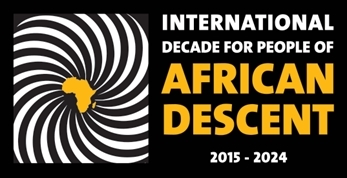
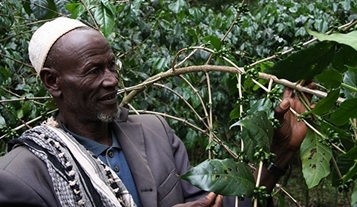
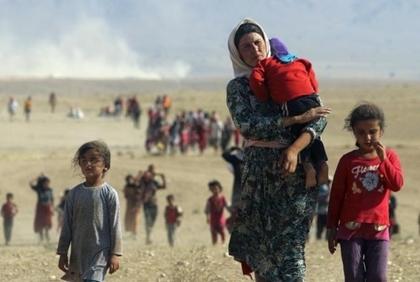
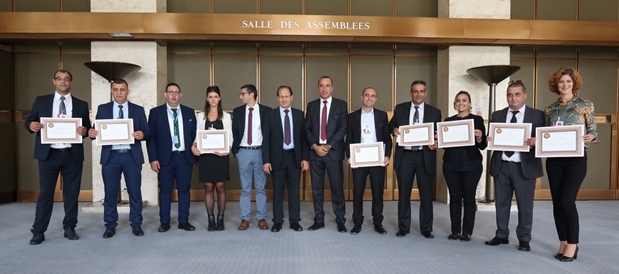
 In 2017, GICJ published 30 articles with the aim to explain its position on different international issues celebrated by the UN International Days. The different days on which GICJ wrote about are the following: International Women’s Day (8 March); International Day for Mine Awareness and Assistance in Mine Action (4 April); International Day of Reflection on the Genocide in Rwanda (7 April); Remembering Victims of Chemical Warfare (29 April); International Children’s Day (1 June); World Refugee Day (20 June); International Day in Support of Victims of Torture (26 June); International World Population Day (11 July); Nelson Mandela Day (18 July); World Day Against Trafficking in Persons (30 July); Day of World’s Indigenous People (9 August); World Humanitarian Day (19 August); Day for the Remembrance of the Slave Trade and its Abolition (23 August); International Day of the Victims of Enforced Disappearances (30 August); International Literacy Day (8 September); International Day of Peace (21 September); World Day Against Death Penalty (10 October); International day of Rural Women (15 October); International Day for Tolerance (16 October), World Food Day (16 October); International Day of the Eradication of Poverty (17 October); International Day to End Impunity for Crimes against Journalists (2 November); International Day for Preventing the Exploitation of the Environment in War and Armed Conflict (6 November); United Nations Day (24 October), Universal Children’s Day (20 November); International Day for the Elimination of Violence against Women and Girls (25 November); International Day of Solidarity with the Palestinian People (29 November) ; Commemoration and Dignity of the Victims of the Crime of Genocide and Prevention of this Crime (9 December); International Day for the Abolition of Slavery (2 December); Human Rights Day (10 December).
In 2017, GICJ published 30 articles with the aim to explain its position on different international issues celebrated by the UN International Days. The different days on which GICJ wrote about are the following: International Women’s Day (8 March); International Day for Mine Awareness and Assistance in Mine Action (4 April); International Day of Reflection on the Genocide in Rwanda (7 April); Remembering Victims of Chemical Warfare (29 April); International Children’s Day (1 June); World Refugee Day (20 June); International Day in Support of Victims of Torture (26 June); International World Population Day (11 July); Nelson Mandela Day (18 July); World Day Against Trafficking in Persons (30 July); Day of World’s Indigenous People (9 August); World Humanitarian Day (19 August); Day for the Remembrance of the Slave Trade and its Abolition (23 August); International Day of the Victims of Enforced Disappearances (30 August); International Literacy Day (8 September); International Day of Peace (21 September); World Day Against Death Penalty (10 October); International day of Rural Women (15 October); International Day for Tolerance (16 October), World Food Day (16 October); International Day of the Eradication of Poverty (17 October); International Day to End Impunity for Crimes against Journalists (2 November); International Day for Preventing the Exploitation of the Environment in War and Armed Conflict (6 November); United Nations Day (24 October), Universal Children’s Day (20 November); International Day for the Elimination of Violence against Women and Girls (25 November); International Day of Solidarity with the Palestinian People (29 November) ; Commemoration and Dignity of the Victims of the Crime of Genocide and Prevention of this Crime (9 December); International Day for the Abolition of Slavery (2 December); Human Rights Day (10 December).


